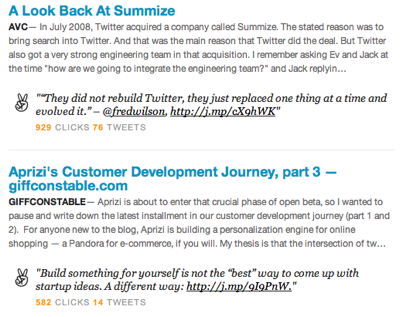I've been thinking a lot about the differences between first time and serial entrepreneurs. We invest in both and do not have a preference betweeen the two. But there are significant differences.
The best first time entrepreneurs have been stewing on their idea for quite a while. It is a personal passion of theirs and they bring to it a fresh take, a stubborn insistence on their approach, and they obsess about the idea 24/7. They often get the right product into the market at the right time and they capture the user's attention and usage with that product/market fit.
Where first time entrepreneurs often struggle is when the product works so well that they have to quickly build a company to support the product. Most of the time, the first time founder has not spent anytime thinking about what kind of company they want to build, what kind of people they want to surround themselves with, what kind of culture they want to create, etc. The first time founder often has no experience recruiting, managing teams, and building organizations.
Serial entrepreneurs, on the other hand, often struggle with the founding idea and getting to product/market fit. They start the second and third and fourth company because they love startups and they don't know any other way to work and be productive. But they often lack that passion around a singular idea that drives first time founders.
But when serial entrepreneurs do settle on the right idea and find product/market fit, they are usually terrific at building the company. They know when to step on the gas and where. They know how to recruit, manage, and structure organizations.
I was talking about this dichotomy with another venture capitalist the other day. I likened it to the first album/second album issue with rock bands. So many bands struggle with the second album and there are many reasons for it. The first album is something they have been working on for years. These are the songs they played night after night in the clubs working their way up. These are the songs that got them their fanbase and got them signed. The album hits, people love it, and then they spend the next year touring like crazy to build their fanbase. And then they have to go back into the studio and write and record a second record in a matter of months. It is no wonder that is is terribly hard to produce a second record as good as the first.
Likewise, it is often hard for the serial entrepreneur to produce a second startup that is good as their first. It takes a lot of patience and collaboration with others, two things they probably did not use much of in their first startup.
As I said at the start of this post, we work with both first time entrepreneurs and serial entrepreneurs with equal interest. We love the ability of great first time founders to nail the product and get significant user traction quickly. And we work closely with them to build the company once that happens. And we understand that is an area they are uncomfortable with and need our patience and support with. We also love the serial entrepreneur's gifts around building the company and taking control of a market once they have gotten product/market fit. We work closely with them in their efforts to find product market fit and we understand those challenges and are patient and supportive during that time.
These observations are generalizations and certainly do not speak to each and every situation we've been involved in. But they do reflect our experience broadly and we think it is important to understand what situation you are investing in, where the challenges will be, and how best to support the startup. Those things will most likely be very different when working with first time founders and serial entrepreneurs.



![Reblog this post [with Zemanta]](http://img.zemanta.com/reblog_b.png?x-id=7be59458-6048-4a3f-bae4-6b9c1bddf15d)
![Reblog this post [with Zemanta]](http://img.zemanta.com/reblog_b.png?x-id=b98573e7-fe1b-4601-9ee6-9c03b63c8393)